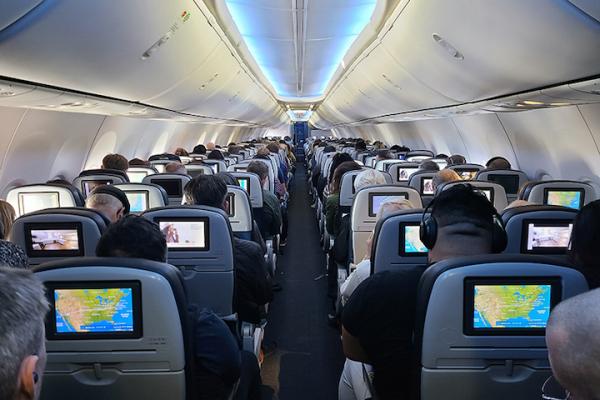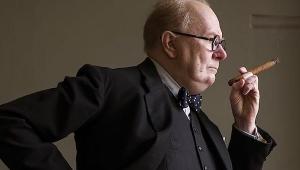Tales of Flying with Noise-Canceling Headphones

Covid-19 hit the fan not long after that. From early 2020 to just this past spring, when I flew to New Jersey for the launch of LG's new 2024 TVs, I hadn't set foot in an airport or on a plane. Though Covid had largely faded by 2023, I had no pressing need for air travel until that LG event.
Sometime in that flight-free, five-year interim I bought a pair of Sony WH-1000XM3 noise-canceling headphones to replace the Bose set I lost. I barely used the Sony headphones at all until another trip two weeks ago but they were easily better than (my faded recollection of) the Bose headphones — and far more comfortable (though I'm pretty sure Bose hasn't exactly stood still over the past 5 years).
As you can probably tell, I'm not a big headphone user, though, if I were, the headphones I'd covet would cost me far more than any noise-canceling design I'm aware of. I don't listen to music when I work or read. I never did, even in school. Any music I'm drawn to grabs my attention so fiercely that I can't use it as background "noise." If the music playing moves me I have to give it my full attention.
Anyway, my Sony headphones did a spectacular job tamping down aircraft engine noise on that recent trip. It couldn't eliminate the drone completely, but the low frequencies were heavily squashed while the higher frequencies were softened dramatically. The latter was most welcomed on one leg of the trip when a toddler, seated a couple of rows behind me, insisted on constantly crying, screaming, and/or otherwise being a chaos-generating machine. But I could hardly hear her at all when noise cancellation was engaged.
There was, however, one persistent glitch. After about 30 seconds of blissful near-silence, the noise cancellation would turn off on its own. Nothing I could do (which admittedly wasn't much at the time) helped. I could easily turn it back on, but after another half minute or so it would turn off again. I wasn't even playing music during this test — just marveling at how the aircraft's engine noise went from annoying to near silence.
Was it possible that when the headphones sensed silence, they turned the noise cancellation off to save battery life (which in any event is extremely generous on the Sony)? I'm likely missing something here, but in researching a few old reviews of the M3s I found at least one that reported an unwelcome propensity to turn off — though in that case, the problem was intermittent and not consistently repeatable.
No matter what you use when flying, do protect your ears — especially on long flights. If you don't own noise-canceling headphones, I suggest bringing along a decent pair of ear plugs, or even two pair as you'll eventually lose one just when you need it. I find that earplugs with three rubber ridges are easier to insert correctly than the softer, foam type, though the latter are more comfortable. But don't insert earplugs until you're near maximum altitude, and take them off just prior to descending. Removing them as the plane climbs and descends should make it easier to clear your ears.
Commercial aircraft are generally pressurized to maintain an interior cabin "altitude" of 8,000 feet even though the actual cruising altitude can be 30,000 feet or higher (flight level 300 in pilot speak!). Pressuring the cabin to 8,000 feet ensures that all healthy passengers can breathe normally.
But even going up or down to or from a cabin pressure of 8,000 feet can cause your ears to plug up. Some aircraft are smoother at this transition than others, and various factors can affect how you respond to it. If you have a cold your ears can plug up more easily; bringing a small vial of nasal spray might make it easier to keep your ears clear enough to respond properly to the change in air pressure. (But be aware of the carry-on limits for liquids during the pre-flight security check!).
I've had in-flight experiences where I hardly noticed the pressure change and others where one ear was plugged up enough to cause alarming (but temporary) pain. In either case, that nasal spray might help, as might repeated yawning, gum chewing, frequent prominent swallowing or, in extreme cases, something called the Valsalva maneuver. I won't describe the latter here as it must be applied properly and there are important caveats to its use. Google it for more information.
Nature never expected us to move rapidly between areas of different air pressure! Your ears are connected to the outside world through tiny "eustachian" tubes, one for each ear, which run from the middle ear to the back of the throat. When these tubes are plugged up, as they might be when you have a cold, the pressure changes in your inner ear(s) can't respond quickly enough, which can result in mild or severe discomfort in one or both ears until the pressure differential is ultimately resolved.
The recent airline trip I mentioned was to northwest Indiana for a college reunion. On the return trip, the airport crowds were crushing. And when I got to my departure gate the flight was delayed three hours for maintenance! As a once-upon-a-time pilot myself (military, not commercial) I know how complex aircraft are. The issue was eventually resolved (by a replacement plane!) and I finally got home in one piece. (If you're not a nervous flyer, check out the numerous and often compelling aircraft crash investigations on YouTube).
PS: If you have the opportunity to attend a reunion, do it! But if you fly, allow plenty of time between connecting flights if your travel is within a week of a major holiday. In my case, that was the weekend after Memorial Day! Two of my flights were on Boeing aircraft. At least no doors flew off! But one of my reunion classmates, who had been a commercial airline pilot, had a more positive take. As he relayed the saying (with apologies to Air Bus), "If it ain't Boeing, it ain't going!"
























































